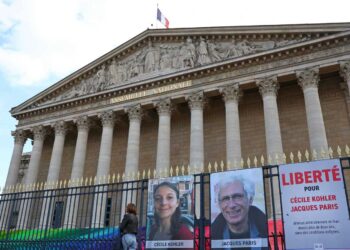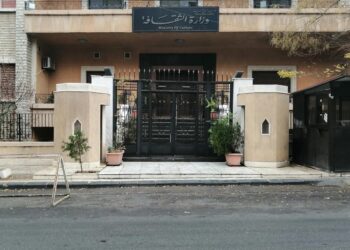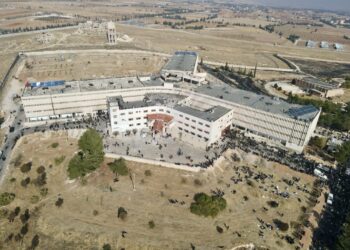Between March 6 and 10, Syria was plunged into darkness as the Syrian coastal cities of Latakia, Tartous, and Hama became battlegrounds in a violent sectarian struggle, fueled by armed “remnants” of the Assad regime.
For four days, the nation was consumed by chaos, as these rogue elements — operating outside the state’s authority — unleashed brutality. In just 96 hours, 803 people were killed, marking the deadliest and most troubling surge of violence since the fall of the house of Assad on December 8.
This resurgence of bloodshed highlights the reality of Syria’s fragile transition under its new president, Ahmed al-Sharaa.
While the Assad regime may have crumbled, the forces that sustained it have not been eradicated; they persist, entrenched in the coastal regions, refusing to disarm or engage in the political process.
Syria is far from emerging from the shadows of its past. The country remains trapped in a precarious and unfinished transition, with armed groups that refuse to bow to the new government’s authority, standing as a constant threat to peace.
The spectre of Syrian sectarianism
The landscape of conflict is currently defined by a volatile triangle of power. On one side, there is the transitional government, represented by the Ministries of Defense and Interior, the Internal Security Forces, and the Transitional Army. Loyalist armed factions exist — nominally incorporated under these two bodies — but operate with limited military and organisational discipline.
Against them stand the armed groups that operate beyond the state’s reach and are directly linked to the former Assad regime. Comprised largely of former military officers, security personnel, and pro-regime militias, these groups — often referred to as “remnants” in local discourse — represent the ghosts of the deposed Assad regime.
Adding to the complexity is the rise of armed civilian groups from the affected or neighbouring areas. These factions are split in their loyalty, with some rallying behind the transitional government while others continue to pledge allegiance to the loyalist forces of the former regime.
The intersection of sectarian, political, and social identities within these groups has only deepened the divisions, creating an unstable security environment.
This tangled web of actors — the transitional government with its disorganised loyalist factions, the remnants of the former regime, and the independent armed civilian groups — has dramatically escalated the conflict, leading to widespread violence and gross violations of international humanitarian and human rights law.
The organisation I founded, The Syrian Network for Human Rights, meticulously documented the deaths of 803 individuals over the four days. Of these, 383 were killed by “remnants” of the Assad regime — including 211 civilians.
Meanwhile, Syrian military forces were directly responsible for the deaths of at least 420 people, a number that includes both civilians and disarmed members of pro-regime factions.
The majority of these killings were carried out by military units that had recently integrated into the General Security Administration, underscoring a lack of discipline within the state’s security apparatus.
Mass killings were particularly rampant during this period, especially in areas like Jableh, Baniyas, and surrounding villages in the governorates of Latakia and Tartous. Armed groups affiliated with the former regime launched sporadic attacks and ambushes, leaving a trail of civilian casualties among those who had no part in the conflict.
On the other side, armed forces loyal to the transitional government — often local and foreign factions operating with alarming indiscipline under the Ministry of Defense — conducted violent raids, executing civilians in large numbers simply for their perceived sympathies with or affiliations to the former regime’s armed groups.
In response to the events between March 6 and 10, 2025, the transitional government formed an independent national investigation committee to probe the violations and hold perpetrators accountable. While this is a positive step, I urge for greater independence and transparency in the committee’s work.
The Syrian Network for Human Rights (SNHR) has recommended including independent human rights representatives, members of the Alawite community, and local residents in the investigation to ensure credibility and reduce bias. We also call for the committee’s mandate to be extended beyond the initial 30 days and to cover all affected regions, not just the coastal areas.
To promote justice and stability, SNHR has urged the government to strengthen oversight of allied armed groups and ensure transparent investigations leading to fair trials. The network also called for immediate civilian protection, security reforms, and better training to ensure adherence to international human rights laws. Furthermore, we emphasise the need for security forces to protect hospitals and media personnel during operations, with perpetrators of sectarian or politically motivated violence held accountable.
On the societal level, SNHR advocates for grassroots efforts to reduce sectarian tensions, promote national dialogue, and support documentation of violations. We also urge international support for both national and international investigations, humanitarian aid, and efforts to foster reconciliation.
Syria remains mired in the struggle for justice amid the ongoing devastation. The March 2025 violence is yet another painful chapter in the country’s prolonged tragedy, highlighting the essential role of accountability in the pursuit of peace. Justice is not merely a promise; it is the key to restoring dignity and healing the deep wounds left by years of conflict.






